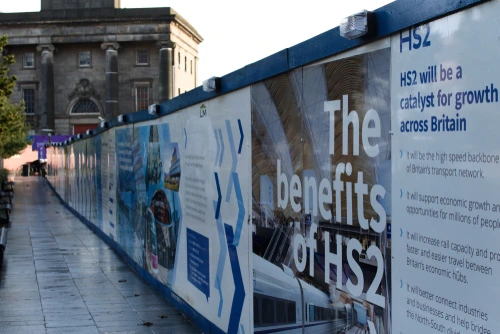
This article on HS2 was originally published back in May 2015, and is re-run due to the cancellation of the Birmingham to Manchester section.
Will HS2 free up space on our railways and get lorries off the motorways? Or is it all just a waste of money that will destroy the English countryside?

If you want to know why the UK will build HS2 then the only question that matters is, “Have you ever been to Milton Keynes?”
Endless roundabouts, concrete cows, and suburbs with names like “Walnut Tree” and “Coffee Hall”, the UK’s fastest-growing city is a bizarre place. But nothing about it is more unusual than its politics.
Milton Keynes is a pretty big city. Both of its MPs are Conservatives. If you’ve been paying attention, that should shock you.
In Manchester, Sheffield, Birmingham, Liverpool, and Leeds – the cities at the ends of HS2 – elections are pretty much a formality. Sure, there are leaflets, and hustings, and campaigns like anywhere. But none of it matters because at the end of it all most people vote Labour anyway. In Milton Keynes they often don’t.
So what does this have to do with a railway? Well, the track from London to Birmingham, and Liverpool, and Manchester – the track that may or may not be too slow, too full, better with freight on, or about to vandalise England’s countryside – goes through Milton Keynes. And every day thousands of people from Milton Keynes cram themselves onto trains to do well-paid jobs in London.
An annual season ticket from Milton Keynes to London costs £4,880. That works out at just over £10 a journey for a trip of 45 miles each way, about £0.25 a mile.
Walk up to Manchester Piccadilly station early in the morning and ask for a ticket to London, and the £164.50 you’ll be charged works out at about £1 per mile. However you do the maths**, the people of Manchester are paying a lot more than the people of Milton Keynes to use the same stretch of railway.
This isn’t an accident or an oversight; this was how the system was designed when the railways were privatised. The government chickened out of letting train companies set the prices of all tickets and intervened at the last minute. Train companies could charge peak-time day-trippers what they liked; but commuters would have their fares kept low by the government.
The problem we face now is that the railway is nearly full. Passenger numbers are increasing, and a select group of travellers are exempt from the usual mechanism of rationing supply – price.
The market solution to this problem would be simple. Fares for commuters from Milton Keynes should increase, to stop the railway from getting too full. But the Conservatives have promised not to raise fares.
There is an alternative market solution. Network Rail could cancel some trains from Milton Keynes and run more from Manchester. That would increase the number of Mancunians, paying much more for their journeys, who could still travel. This would make Network Rail money, and save the taxpayer cash – but it would be very unpopular in Milton Keynes.
The third solution is to build a new railway, that takes some of the strain off the line between Milton Keynes and London. That way the commuters of Milton Keynes can keep enjoying cheaper travel than Mancunians, and both can still take the train.
HS2: fares between Milton Keynes and London are too low to justify building a new railway
So here’s the really clever bit about HS2. We build the new railway we need to the midlands – but then keep building it north to Manchester even though we don’t need to. This lets us say that we’re building it to serve Mancunians: then we can then use their much higher fares to make the scheme look like better value for money.
Politically this trick is perfect. Commuters in Milton Keynes get investment from the government (indirectly, through the relief to the existing line), and politicians can say that they’re investing in the North. It wins votes in places they matter, and costs them in safe seats where they don’t.
So here’s my advice when you’re thinking about HS2. Don’t get distracted by Birmingham or Manchester. Don’t get distracted by the countryside, by the speed, by the lorries we could take off the M6, or by what else we could do with the money.
None of that matters for HS2
If you want to understand why HS2 will be built, go to Milton Keynes Central station at half-past six in the evening and ask a commuter if they’d vote for a party that made their season ticket more expensive. Then ask them if they’d vote for a party that cancelled some of their trains so that more people could get between London and Manchester.
When they say no, remember that these are the people who decide British elections. Their opinions matter more than yours – and their answers leave politicians with only one possible solution. Build HS2.
**Some would argue that this is an unfair comparison. But almost no one in Manchester commutes every day to London, so the majority of passengers are buying anytime tickets. By contrast, lots of people in Milton Keynes commute to London, so the majority of passengers are buying season tickets. (These are 2015 figures)
It doesn’t matter that they’re travelling on different types of tickets: these are the prices most likely to be paid by the passengers currently taking up space on the West Coast Main Line.






